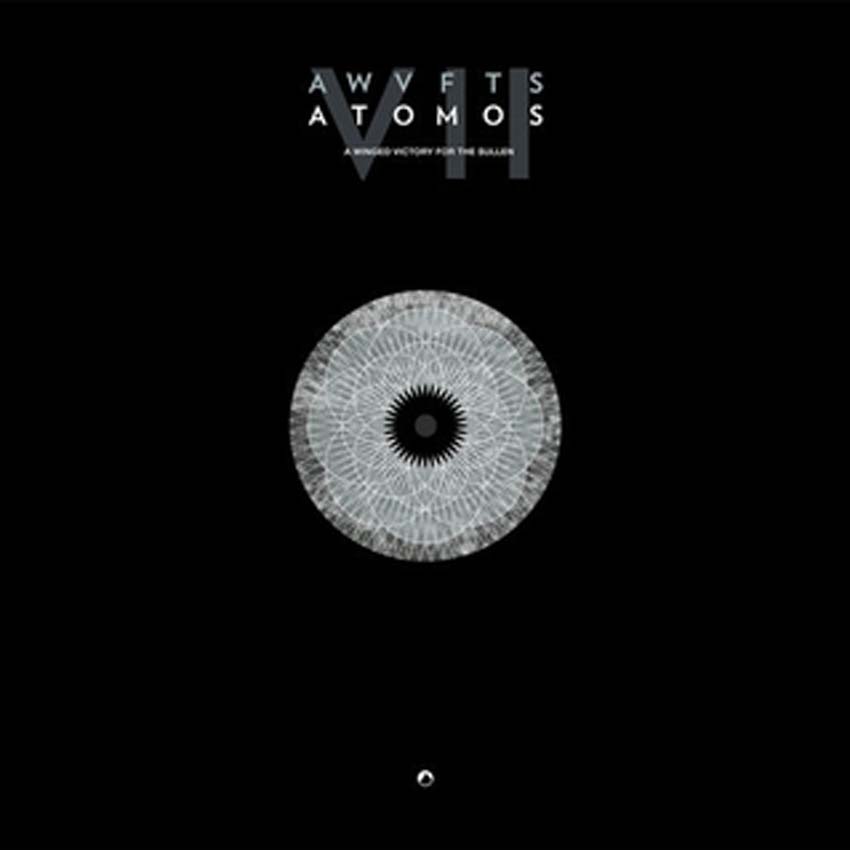- Administrator
- Albums and Singles
 This album is a bit of an experiment in simplicity for Bissonnette, as he decided to limit himself solely to sounds generated from a synthesizer that he built himself.  While I was initially dismayed to see that such a reliably excellent composer had tossed in his lot with the recent glut of synth-worshippers, I am pleased to report that Christopher has not completely lost his mind and that he is still making music that is distinctively his own.  As a complete album, Essays does not quite stand with Bissonette’s lusher and more varied previous work, but some of the individual pieces are certainly quite good and I always like it when an artist takes an unexpected gamble.
This album is a bit of an experiment in simplicity for Bissonnette, as he decided to limit himself solely to sounds generated from a synthesizer that he built himself.  While I was initially dismayed to see that such a reliably excellent composer had tossed in his lot with the recent glut of synth-worshippers, I am pleased to report that Christopher has not completely lost his mind and that he is still making music that is distinctively his own.  As a complete album, Essays does not quite stand with Bissonette’s lusher and more varied previous work, but some of the individual pieces are certainly quite good and I always like it when an artist takes an unexpected gamble.
As Kranky are quick to mention in their description of Essays in Idleness, Bissonnette wields his synthesizer a bit differently than most of his contemporaries, choosing to focus primarily on slowly transforming sustained tones.  In that regard, this album makes perfect sense, as Christopher is no stranger at all to droning, drifting ambiance and the right synthesizer can offer some rather amazing possibilities for the real-time textural manipulation of such sounds.  While Bissonnette does not rely particularly heavily on that feature, he certainly manages to score impressively with the opening "Greenish in its Light," an absolutely beautiful mélange of warm drones, randomized buzzes, and melancholy bloops.
Unfortunately, Christopher then haplessly blunders into one of my personal peeves with "A Deplorable Corruption," opting for some dated retro-futurist textures that scream "‘70s science program soundtrack."  That just about derails the album entirely for me, as he seems quite fond of those glistening artificial sounds, repeating them yet again on the following "Entanglements."  Thankfully, "Delusions" restores some of the lost momentum, gradually evolving from gently buzzing ambiance into something much more complex, quavering, and emotionally resonant.
From then on out, Essays is almost unwaveringly solid, though none of the remaining four songs quite manage to topple "Greenish" as the album’s reigning highlight.  "Missing Chapters," for example, evokes an otherworldly tableaux of bittersweet loneliness and distant memories, while "Uniformity is Undesirable" dabbles uncomfortably close to those accursed science film textures, but keeps them pleasantly ominous with some well-placed swoops and snarls.  Similarly dated textures dog the weaker "Another Moving Sight," but it at least boasts an appealing throb and builds to a likable (if a bit understated) crescendo. Essays then concludes in fine fashion with the sublimely twinkling and blissed-out coda of "Wasting a Little Time."
All of that adds up to a perfectly likable album, but Essays is definitely a relatively minor and divergent addition to Bissonnette's discography.  If I were not so predisposed to like Christopher due to his previous work, I probably would not have allowed myself much of a chance to get drawn in beyond "Greenish in its Light."  However, once I started actively looking for reasons to like Idleness, I certainly found them.  While I think that anyone new to Bissonnette should probably bypass this one, as its very limited palette sacrifices quite a bit of depth and humanity, longtime fans will likely find this to be a pleasant enough detour (and will need to at least hear "Greenish").  Or they will be absolutely heartbroken that Christopher's first solo album in seven years is so different from what they were expecting.  It is hard to say.  God, I wish Bissonnette was more prolific.  Damn.
 
Read More
- Administrator
- Albums and Singles

Inventions is the new band formed by longtime friends, tourmates, and labelmates Matthew Cooper of Eluvium, and Mark T. Smith of Explosions In The Sky. It began in earnest in 2013 when Cooper invited Smith to collaborate on a song for Eluvium's otherworldly double-album, Nightmare Ending. The track, "Envenom Mettle," was a standout on an album full of them, and just like that a longstanding friendship blossomed into a full-fledged creative partnership. There are plenty of talking points here: The fact that Cooper hasn't been in a “band” of any sort since he was a teenager; no member of Explosions In The Sky has released an album outside of the context of EITS since their inception in the late 90s; and, of course, this is a dream duo for anyone familiar with the unparalleled emotional resonance of Cooper and Smith's respective day jobs. However, thirty seconds into their eponymous debut album, you realize that the esteemed pedigree is irrelevant. Inventions exceeds all expectations by discarding them from the get-go. They have created their own tiny, wondrous corner of the world, one with ever-changing sounds and colors.
More information is available here.
Read More
- Administrator
- Albums and Singles
 Qa'a is a long-running psych-rock project centered around Spain's Victor Hurtado (Huan) and it is quite a bizarre one, both conceptually (magical/quasi-ritualistic in intent) and musically (it sounds like a lost dispatch from Krautrock's weirdest fringes).  Consequently, it is no surprise that Hurtado has collaborated with Nurse With Wound in the past or that Qa'a's work has been championed by the über-eccentric Julian Cope.  I am not certain that I myself necessarily champion this overwhelming triple-LP, but Sang is undeniably significant and ambitious, resembling nothing less than the spiritual successor to folks like Can and Faust, albeit one that is also indebted to noise, outsider art, and Miles Davis' wilder fusion-era excesses.
Qa'a is a long-running psych-rock project centered around Spain's Victor Hurtado (Huan) and it is quite a bizarre one, both conceptually (magical/quasi-ritualistic in intent) and musically (it sounds like a lost dispatch from Krautrock's weirdest fringes).  Consequently, it is no surprise that Hurtado has collaborated with Nurse With Wound in the past or that Qa'a's work has been championed by the über-eccentric Julian Cope.  I am not certain that I myself necessarily champion this overwhelming triple-LP, but Sang is undeniably significant and ambitious, resembling nothing less than the spiritual successor to folks like Can and Faust, albeit one that is also indebted to noise, outsider art, and Miles Davis' wilder fusion-era excesses.
There are two aspects of this opus that immediately eclipse everything else about it.  The first is the length, as listening to almost 100 minutes of psych-rock squall, effects-heavy caterwauling, and electronic entropy is more of an event than a mere listening experience.  However, Sang is one of those rare albums where the vinyl format actually enhances listenability in a meaningful way, as each of its three records are intended to work as discrete sections that can be played in varying arrangements.  The other prominent feature of Sang is how remarkably authentic it sounds, as Qa'a are definitely not some guys who liked Tago Mago a lot and decided to make their own pastiche.
Rather, Hurtado and his bandmates seem far more like lost members of the Amon Düül commune that emerged from a forest after 18 years with some self-made instruments and wondered where everyone else went.  That said, I think Can probably was a huge influence, as Qa'a share Damo Suzuki's very "free" approach to vocals and lyrics, as well as the band's penchant for strong grooves (and periodic forays into ethnographic forgeries).  While a few songs, like "El vent mou l'aigua," admittedly do sound a bit too Can-like for my taste, Qa'a's version of Krautrock usually seems to be a significantly more snarling, chaotic, and primal strain than that unleashed by their forebears.  No one will ever accuse Qa'a of having motorik grooves nor will anyone ever be able to fall asleep with Sang playing in the background.
Happily, Sang’s best songs also tend to be its longest.  I definitely do not think that Victor squandered a single second worrying about things like hooks or structure, but Qa'a's gleefully unfettered freedom and spontaneity yield quite a few striking passages and surprises.  While the band primarily focus on free-form psych jams with crescendos of howling vocals and cacophonous guitars, they rarely overstay their welcome or allow themselves to meander for too long.  Rather, the longer pieces tend to be broken up or separated by collage-like interludes or passages of noise/industrial electronics.  I get the definite sense that Sang was culled from hundreds of hours of improvisations and experiments.  I also think several hundred more hours were then spent painstakingly shaping it all into a sprawling psych-rock voyage that frequently casts both rock and reality aside in hopes of creating a mindfuck of epic proportions.
Whether Qa'a actually succeeded in what they were trying to do or not is not entirely clear to me, as I am not personally a huge fan of a lot of their revered influences and kindred spirits.  A strong case could certainly be made that Sang is a towering monument to self-indulgence that sounds like it was culled from incompletely shaped improvisations from 30 or 40 years ago, but I could probably level a similar charge at some Can albums.  I did find some of Hurtado's spontaneous-sounding vocalizing to be a bit annoying though.  Still, Sang feels like a major statement nonetheless and it appeals strongly to my love of outsider art: Victor is clearly someone who absolutely, completely does not care what the rest of the world is doing and Qa'a's bizarro, ritualistic free-form psychedelia is delivered with total sincerity and conviction.  I suspect that Sang's unique charms will resonate most strongly with obsessive fans of Faust, Can, and the like, but Qa'a might also appeal to those looking for a dispatch from rock's fringiest and most uncompromising outer limits.  In that regard, Sang is hard to top.
Samples:
 
 
Read More
- Administrator
- Albums and Singles
 The Soft Pink Truth is the solo alter ego of Drew Daniel, one half of celebrated Baltimore-based electronic duo Matmos. After a decade of silence in which Daniel concentrated on Matmos and becoming a Shakespeare professor, The Soft Pink Truth is set to release Why Do the Heathen Rage? whose subtitle “Electronic Profanations of Black Metal Classics” reveals its bizarre agenda as an unrequited love letter to a justly divisive genre. A gleeful queer travesty of black metal’s undying obsession with kvlt authenticity, Why Do the Heathen Rage? is also a formally precise homage executed with a scholar’s obsession. With the guitar chord transcription assistance of Owen Gardner (Teeth Mountain, Horse Lords) and a coven of guest vocalists, including Antony Hegarty and members of Locrian and Wye Oak, Daniel meticulously transposes the riffs, structures and patterns of black metal chestnuts and deep cuts by Darkthrone, Venom, Mayhem, Sarcofago and more into oddly hybrid new forms. Cruising camp absurdity by forcing a sticky tryst between the two mutually incongruous early 90s subcultures of rave and black metal, the results are bracingly strange on first listen, but curiously addictive as the album sinks in.
The Soft Pink Truth is the solo alter ego of Drew Daniel, one half of celebrated Baltimore-based electronic duo Matmos. After a decade of silence in which Daniel concentrated on Matmos and becoming a Shakespeare professor, The Soft Pink Truth is set to release Why Do the Heathen Rage? whose subtitle “Electronic Profanations of Black Metal Classics” reveals its bizarre agenda as an unrequited love letter to a justly divisive genre. A gleeful queer travesty of black metal’s undying obsession with kvlt authenticity, Why Do the Heathen Rage? is also a formally precise homage executed with a scholar’s obsession. With the guitar chord transcription assistance of Owen Gardner (Teeth Mountain, Horse Lords) and a coven of guest vocalists, including Antony Hegarty and members of Locrian and Wye Oak, Daniel meticulously transposes the riffs, structures and patterns of black metal chestnuts and deep cuts by Darkthrone, Venom, Mayhem, Sarcofago and more into oddly hybrid new forms. Cruising camp absurdity by forcing a sticky tryst between the two mutually incongruous early 90s subcultures of rave and black metal, the results are bracingly strange on first listen, but curiously addictive as the album sinks in.
Imitating the countless black metal albums that begin with ominous intros, the album commences with “Invocation for Strength”, a spoken word track in which a Radical Faery poem used by gay activist Arthur Evans in his classic Witchcraft and the Gay Counterculture is read by Drew Daniel and Antony (Antony and the Johnsons). After this queer hymn, the rhythmic assault begins with an industrial gabber take on Venom’s genre-founding song “Black Metal”, featuring vocals by Baltimore artist Bryan Collins and screams from Daniel. Stark trap beats and rave synths meet two-step house bounce on “Sadomatic Rites,” originally by Beherit, whose electronic opus H418ov21.c was an inspiration to Drew as he was making this album. Adding a witchy twist to an underground metal classic, Jenn Wasner (Wye Oak, Dungeonesse) lends her smoky, soulful voice to an orgasmic house deconstruction of Sarcofago’s redlight anthem “Ready to Fuck.” After a surprisingly sensitive guitar led intro, “Satanic Black Devotion” erupts with full on screaming vocals from Terence Hannum (Locrian), paired with IDM beats, synthetic banjo, and a rather glaring plunderphonic re-working of a recognizable dancefloor classic. Side Two kicks off with a stark, vogue-ball inspired rethinking of Darkthrone’s “Beholding the Throne of Might”, with whispered vocals from London based free improviser/composer Jennifer Walshe and a spoken interlude from David Serrotte of the vogue ball crew House of Revlon. The goth factor spikes on “Buried by Time and Dust”, in which Daniel’s Matmos partner M.C. Schmidt croaks the lyrics to the vampiric Mayhem original on top of MIDI harpsichord while a moldy 808 drops the “Planet Rock” beat. In an Ouroboric final gesture, the album concludes with a paroxysmic take on “Grim and Frostbitten Gay Bar” by Impaled Northern Moonforest, the parodic fake black metal project of Anal Cunt’s Seth Putnam. A blizzard of snippets of pop, house, crust and metal are shredded and smothered in lo-fi screaming and arctic field recordings, ending the album on suitably contradictory notes of mockery and celebration. The album’s controversial artwork, which will remain redacted for the time being due to the extreme content it portrays, fits those themes as well, depicting a volatile, extremist scene undergoing a long overdue queerification, coming out rich and strange, shiny and pink.
The Soft Pink Truth was started in 2001 when legendary UK house producer Matthew Herbert challenged Drew to “make a house record,” resulting in the project’s slyly funky debut album Do You Party?, which Herbert released on his own Soundslike Records. Daniel has also produced floor-burning remixes for Bjork, Herbert, Grizzly Bear, Dat Politics and many more under The Soft Pink Truth moniker. “Why Do The Heathen Rage?” follows his 2004 release “Do You Want New Wave or Do You Want The Soft Pink Truth?,” a collection of electronic interpretations of UK punk and American hardcore songs. As a member of Matmos, Daniel continues to break down established norms of experimental and pop music practice by filtering genres through unique and brilliant conceptual lenses, and has established himself as one of the most individualistic electronic musicians of the past several decades.
Disclaimer: Aesthetics and Politics are neither equivalent nor separable. Black metal fandom all too often entails a tacit endorsement or strategic looking-the-other-way with regards to the racist, anti-Semitic, sexist and homophobic bullshit politics that (still) pervade the scene, on behalf of either escapist fantasy talk, shaky invocations of art as a crypto-religious path to transcendence, or--the oldest cop out in the book--the quietist declaration that “I just like how it sounds.” Just as blasphemy both affirms and assaults the sacred powers it invokes and inverts, so too this record celebrates black metal and offers queer critique / mockery / profanation of its ideological morass in equal measure. Mixed emotions about a murky, diverse and self-differential scene are all very well, but, as Barack Obama is so fond of saying at press conferences just before legitimizing drone warfare, let’s be clear: No apologies, no excuses, and no escape clauses are hereby offered. Murderers are murderers. No safe space for fascist garbage. The Soft Pink Truth hereby abjures black metal homophobes, racists, and Nazis categorically and absolutely: MAY THIS CURSE BIND! Remember Magne Andreassen!”
Read More
- Administrator
- Albums and Singles
 A pseudo-political noise project in the vein of the Grey Wolves, the debut from U-731 (also known as United Front) channels a lot of that legendary duo's punk infused angst but a little less of its tongue in cheek sarcasm. With guest spots from members of Steel Hook Prosthesis and the Vomit Arsonist, it results in a forceful record that makes no attempt to hide its disdain for the current state of US politics.
A pseudo-political noise project in the vein of the Grey Wolves, the debut from U-731 (also known as United Front) channels a lot of that legendary duo's punk infused angst but a little less of its tongue in cheek sarcasm. With guest spots from members of Steel Hook Prosthesis and the Vomit Arsonist, it results in a forceful record that makes no attempt to hide its disdain for the current state of US politics.
The songs featuring John Stillings (Steel Hook Prosthesis) lie somewhere between the menace of death industrial and the onslaught of power electronics.On "Forced Neurotic Displacement," a thin electronic drone sets the stage for heavily processed and flanged vocals, a staple of the latter genre.Hollow samples and an overt synthesizer progression give it its own feel, however, and an added layer of nuance and complexity.The intensity is ratcheted up on "The Mechanics of Embalming," with the vocals a bit more forceful and a harsher electronic backing, without ever becoming too noisy.
While there may have been subtlety and restraint on the front end of the album, the two long pieces with Andy Grant (The Vomit Arsonist) are anything but."F.E.M.A. Care" may begin with erratic samples and slow, menacing electronics, but it soon launches into a full on assault, with blasting noise and hate filled shouts.The title piece mimics the same pattern, initially ambient and sample-based before transitioning into a blast of pure anger and explosive electronics.
The two pieces that do not feature any guest vocalists stick to a more atmospheric mood, opting for a slow burn rather than an overt affront on the senses."Aktion-Freedom, Re-Aktion Resistance" has the trio building up cautiously, dripping with menace lurking beneath echoing samples but never releasing that tension.The closing "Suo Gan/Last Rights" follows suit, utilizing on historical speech samples in place of a vocalist.
The guest vocalists may add a lot to the overall force of By All Means, but the pieces without vocals demonstrate that the band itself played a predominant role in the overall mood and direction of the project.With its violently apolitical tone and imagery, U-731/United Front are nicely perched to succeed in a genre that so many others do not do nearly as well.
samples:
 
Read More
- Administrator
- Albums and Singles
 Melt is an unexpected pairing given my previous experience with both artists. Higuchi I have heard mostly in an almost conventional jazz context, marked by conventional piano playing and her powerful, idiosyncratic vocal style, while Cris X (Cristano Luciani) I associate with harsher, more noise oriented abstractions. Neither deviate too far from what I expected from them on here, but the odd pairing works surprisingly well and comes together as more than the sum of its parts.
Melt is an unexpected pairing given my previous experience with both artists. Higuchi I have heard mostly in an almost conventional jazz context, marked by conventional piano playing and her powerful, idiosyncratic vocal style, while Cris X (Cristano Luciani) I associate with harsher, more noise oriented abstractions. Neither deviate too far from what I expected from them on here, but the odd pairing works surprisingly well and comes together as more than the sum of its parts.
There is a shifting dynamic between the two artists across these five pieces, with one seemingly taking the lead on different pieces, while the other sits squarely between the two artists' respective styles."Ceaseless/Do You Care?" is one of the pieces that seems to favor Higuchi's solo work more, with her slightly pained vocals and piano playing sticking in the foreground, accented by Luciani's crackling textures and distant noisy clattering.
A similar sense can be heard on "Tell Me What You Got to Say," where the sound is stripped back to sparse piano chords and calmer vocals, with the more dissonant moments reserved for backing textures.In contrast, "In Obscurity" is more consistent with what I have heard from Luciani before, with its sharp, piercing electronics slicing through the otherwise peaceful piano and vocals.For the second half the noise dulls to a dark rumble and far off field recordings, but dissonance stays as the primary focus.
On "Sister/You Left Me So Insane," the two seem to be at equal footing, with Higuchi's piano swells and dramatic vocals pairing with Luciani's dense, reverberated noise backing to create a hybrid of the two artists' repertoire.Though both are equally represented stylistically, the darkness is undeniable.The closing title piece stands out perhaps the most as sounding somewhat like neither artist specifically, but something altogether unique.A slow bed of traditional Japanese percussion underscores the constantly shifting vocals (in mood and tone) that remain harsh without every truly becoming noisy.Even when the more familiar sound of Higuchi's piano arrives, it remains more of an accent than the primary focus.
Higuchi and Cris X work with very different sounds and styles on their own, and while superficially the two may not seem complimentary, the overreaching dark but beautiful mood is what draws them together.Normally I would expect the more unsettling moments to come courtesy of the electronics, but the most chilling moments were largely Higuchi's contributions.It is the combination of both, however, that causes Melt to excel.
samples:
 
Read More
- Administrator
- Albums and Singles

Watter is a new trio made up of close friends and collaborators whose collective pedigree reads like a desert island list of must-haves in experimental rock musicians. Multi-instrumentalists Zak Riles (Grails) and Tyler Trotter are anchored by legendary drummer Britt Walford (Slint, Evergreen) on six genre-defying pieces of monolithic mood music.
For Riles and Trotter, it's a chance to dig deeper into the sandbox in which Grails have sculpted many mercurial masterpieces in recent years; for Walford, it's the opportunity to play a substantial role in a new active band for the first time in nearly twenty years.
Written, recorded, and produced entirely in the group's collective studios in Louisville, KY, This World is a stunning combination of heady psychedelic rock, vintage cinematic New Age explorations, and sinister Krautrock, performed with seemingly endless stamina. Born out of many late-night jam sessions, many songs also feature fellow Louisville icons – Rachel Grimes (Rachel's) provides several of the album's most sublime moments, and The For Carnation's Todd Cook lays the heavy, bass-driven foundation for the penultimate epic, "Seawater" – as well as a subtle, sinister contribution from legendary King Crimson bassist Tony Levin. This World is the kind of album that inspires renewed wonder in the mysterious powers of Louisville's water supply. It draws impossibly broad inspiration from decades of Eastern and Western folk, rock, ambient, film score, library music, and neoclassical, and masterfully emerges with an ever-enveloping suite perfectly befitting its constantly curious composers.
Out May 15th.
More information is available here.
Read More
- Administrator
- Albums and Singles

Steve Gunn and Mike Gangloff (Pelt) combine six-and 12-string guitars with gongs, tanpura, singing bowls, shruti box, and banjo fora gorgeous collection of improvised compositions. The two artists took it pretty far off the beaten path for Melodies for a Savage Fix, sequestering themselves for an overnight session in the remote farmhouse/recording studio of noted roots-music engineer Joseph Dejarnette (Carolina Chocolate Drops, Bruce Greene, Curtis Eller) in the countryside of Floyd County, Virginia.
There in the tiny community of Topeka, miles from the county's one traffic light, they set up an assortment of six- and 12-string guitars, gongs and Indian instruments, plus the banjo Gangloff sometimes plays at monthly square dances at a country store just up the road, and settled in for an intense night of improvisation.
More information is available here.
Read More
- Administrator
- Albums and Singles

Acid Mothers Temple & The Melting Paraiso U.F.O.'s new album Astrorgasm From The Inner Space features their original vocalist Cotton Casino and is being released in conjunction with their two-month tour of the USA beginning April 23rd at the Mercury Lounge in New York City. Available on CD and deluxe double LP.
As usual, AMT delivers to Important their most scorching tracks. They've included, appropriately since Important is set to issue Grayfolded on triple vinyl, a brand new recording of "Dark Star Blues" with Cotton Casino. On Astrorgasm From The Inner Space, Acid Mothers Temple look towards their source (the band turns 19 this year) while also evolving towards their next stage.
More information is available here.
Read More
- Administrator
- Albums and Singles
 For reasons that are not immediately apparent to me, Bécs is being billed as the conceptual follow-up to 2001's landmark Endless Summer.  To me, it just sounds like another characteristically likable Fennesz album with a couple of better-than-usual pieces, though it is certainly much brighter in tone than either Venice or Black Sea.  In any case, this is a fine (and welcome) return by one of experimental music's most distinctive voices, but it is not any kind of seismic event.  It is very hard to be revolutionary more than once, I guess.
For reasons that are not immediately apparent to me, Bécs is being billed as the conceptual follow-up to 2001's landmark Endless Summer.  To me, it just sounds like another characteristically likable Fennesz album with a couple of better-than-usual pieces, though it is certainly much brighter in tone than either Venice or Black Sea.  In any case, this is a fine (and welcome) return by one of experimental music's most distinctive voices, but it is not any kind of seismic event.  It is very hard to be revolutionary more than once, I guess.
If there is a nod to the sun-dappled radiance of Endless Summer, it comes with the opening "Static Kings," which offers up a lazy melody and some strummed acoustic guitars, though they are warped and churned fairly aggressively by Christian's laptoppery.  Unexpectedly, however, "Static" also features a bold new innovation: an actual band…of sorts, anyway, as Fennesz is joined by bassist Werner Dafeldecker and drummer Martin Brandlmayr.Their contributions are fairly subtle and last only for the one song, but Christian is uncharacteristically joined by other musicians twice more before the album runs its course.
He is solo again for the second piece, "The Liar," which brutally erases all traces of any kind of summery vibe.  Consisting primarily of gnarled, buzzing swells that gradually grow in power below an obscured haze of melody, "The Liar" instantly makes itself known as one of Bécs’ clear highlights.  The other clear highlight follows immediately after in the album's 10-minute centerpiece "Liminality," which balances melancholy drones with a surprisingly simple, beautiful, and unprocessed guitar melody.The playing and the melody are themselves straightforward, yet the production is decidedly not, as Christian works some very impressive magic with texture, attack, and dynamics.  The overall effect gradually becomes that of a lovely guitar motif struggling in vain to be heard though an escalating squall of static.  It is not quite a perfect piece, but it is intermittently damn close, falling just shy of being a masterpiece.
After that, however, Christian’s inspiration seems to wane a bit, as the remaining four pieces do not quite offer anything new, just more variations on the established themes or single ideas explored without significant development.  "Palles Athene," for example, is a lengthy bit of brooding, spacey ambient that just drifts along ominously for six minutes, while the title piece evolves from jarring, quavering single notes into yet another roaring torrent of static that conceals a poignant melody.  It is admittedly almost as great as "Liminality," but its impact is dulled a bit by the fact that Christian has already pulled this particular rabbit from his hat once before.
Bécs winds down with "Sav," a grainy, rattling, and crackling soundscape duet with guest Cédric Stevens on modular synth, and the brief "Paroles," a pleasant acoustic guitar-driven reprise of "Static Kings."  Both pieces are likable in their own ways, but neither quite catches fire, though I do like the sputtering and unpredictable electronics that gradually invade "Paroles."  The vibrant textures that Fennesz and Stevens lay down for "Sav" are very impressive too, but the melodic component seems to have been little more than an afterthought, so the promising foundation remains only that.
All of that basically adds up to yet another solid, enjoyable Fennesz album.  It may even be a great album, but it is impossible for me to tell without completely fresh ears, as I have been listening to Christian for 15 years now and I am too desensitized to his aesthetic to be appropriately dazzled anymore.  For the uninitiated, however, Bécs is probably an excellent place to start (as is Endless Summer, of course).  As for those who are already converted, Bécs will not disappoint.  It probably will not rekindle an intense passion either, but it certainly adds at least a few more gems to Christian's already-teetering heap.
 
Read More
- Administrator
- Albums and Singles
 Adam Wiltzie and Dustin O'Halloran's latest offering is a rather lean one, but it is surprisingly beautiful and satisfying nonetheless.  Atomos VII offers up essentially just one new song (a short piece from the forthcoming Atomos full-length) backed by an old outtake and a lengthy Ben Frost reinterpretation of the title piece.  All are enjoyable, but it is the Ben Frost collaboration that elevates this brief EP into something more than just a teaser of what is to come.
Adam Wiltzie and Dustin O'Halloran's latest offering is a rather lean one, but it is surprisingly beautiful and satisfying nonetheless.  Atomos VII offers up essentially just one new song (a short piece from the forthcoming Atomos full-length) backed by an old outtake and a lengthy Ben Frost reinterpretation of the title piece.  All are enjoyable, but it is the Ben Frost collaboration that elevates this brief EP into something more than just a teaser of what is to come.
The Atomos album (due this coming fall) is a score to a dance piece choreographed by the Royal Ballet's Wayne McGregor, an enthusiastic fan of AWVftS's debut.  While it is impossible to say what the rest of that album will sound like, "Atomos VII" sounds almost exactly how I would expect a new Winged Victory piece to sound, as the aesthetic leap from "neo-classical business-as-usual" to "dance score" is virtually a non-existent one for Adam and Dustin.  In fact, the only truly significant change is that "Atomos VII" is entirely devoid of piano, opting instead to augment its warm, serene drones with nothing but a languorously unfolding series of string swells that slowly builds to a crescendo (before, of course, dissipating once more into tranquil ambiance).
The rest of this brief release is rounded out by an outtake from the duo's debut ("Minuet for a Cheap Piano, Number One") and the aforementioned (and comparatively lengthy) Ben Frost collaboration.  The prosaically titled "Minuet" delivers exactly what it promises: a lovely, understated solo piano piece, albeit one floating in a warm haze of ambiance.  More importantly, it makes perfect sense as a companion piece for "Atomos VII," ably furthering this EP’s themes of simplicity, elegance, fragility, and understatement.  The same cannot be said for Frost's stab at re-envisioning the title piece, but "Greenhouse Reinterpretation" works quite wonderfully as a densely roiling and dynamic counterbalance.  Ben is an unexpected participant in this endeavor, as he is not someone I normally associate with quiet or subtle music, though he has worked with McGregor before.  Everything he touches these days sounds great, however, as he has a distinct knack for bringing out the best in anyone fortunate enough to collaborate with him.  That trend continues unabated with "Greenhouse."
Despite its brevity, I think I actually prefer Atomos VII to Winged Victory's debut...or perhaps precisely because of its brevity (and its variety).  While it certainly seems to end too soon, I find myself immediately starting it again as soon as it ends, whereas the self-titled full-length felt a bit too one-dimensional and overlong for me to fully embrace.  It is hard to say how much of this EP's success is due to its truncated length and the presence of Frost and how much is due to Winged Victory's evolution as a band, as all are significant, but I suppose that riddle will be answered when the full-length Atomos eventually surfaces.  In any case, it will have a tough act to follow, as Atomos VII is the rare teaser EP that completely succeeds as its own self-contained release.
 
Read More

